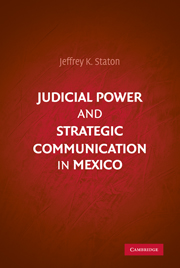Book contents
- Frontmatter
- Contents
- List of Tables
- List of Figures
- Acknowledgments
- PART I JUDICIAL COMMUNICATION AND JUDICIAL POWER
- PART II THE POLITICS OF CONSTITUTIONAL REVIEW IN MEXICO
- PART III RELATIONSHIPS BETWEEN TRANSPARENCY AND LEGITIMACY
- 5 Constitutional Review and the Development of Judicial Legitimacy
- 6 A Cross-National Analysis of Judicial Legitimacy
- 7 Democratic States and the Development of Judicial Power
- References
- Index
7 - Democratic States and the Development of Judicial Power
from PART III - RELATIONSHIPS BETWEEN TRANSPARENCY AND LEGITIMACY
Published online by Cambridge University Press: 06 July 2010
- Frontmatter
- Contents
- List of Tables
- List of Figures
- Acknowledgments
- PART I JUDICIAL COMMUNICATION AND JUDICIAL POWER
- PART II THE POLITICS OF CONSTITUTIONAL REVIEW IN MEXICO
- PART III RELATIONSHIPS BETWEEN TRANSPARENCY AND LEGITIMACY
- 5 Constitutional Review and the Development of Judicial Legitimacy
- 6 A Cross-National Analysis of Judicial Legitimacy
- 7 Democratic States and the Development of Judicial Power
- References
- Index
Summary
Courts that constrain arbitrary government are believed to promote a number of appealing outcomes. They are associated with economic growth and development (Barro 1997; North 1990), the maintenance of civil order (North, Summerhill, and Weingast 2000), the protection of political rights (Howard and Carey 2004), and even with the prevention of torture and other cruel violations of personal integrity (Apodaca 2004: Hathaway 2007; Powell and Staton 2009). An intriguing development in legal research has been the explicit linking of democratic processes to judicial independence and, more broadly, to the rule of law. Although there are rationales for constraining the state through legal institutions under autocratic rule (e.g., Barros 2002; Moustafa 2007), scholars and activists nevertheless remain skeptical on the whole. Examples like Singapore are more than offset by examples like Cuba and Myanmar. Even Egypt, the case around which Moustafa's persuasive analysis revolves, ultimately reigned in its constitutional court when it became overly active in the area of human rights (Moustafa 2007, 198–202). Reflecting a common understanding of the issue, Carothers (2007, 16) writes, “The core point is that rule-of-law development and autocracy … go poorly together. Key elements of the rule of law directly threaten autocratic rule. An independent judiciary will be a source of power and authority beyond the executive's reach.” In general, autocrats just do not create powerful judiciaries.
- Type
- Chapter
- Information
- Judicial Power and Strategic Communication in Mexico , pp. 196 - 204Publisher: Cambridge University PressPrint publication year: 2010



